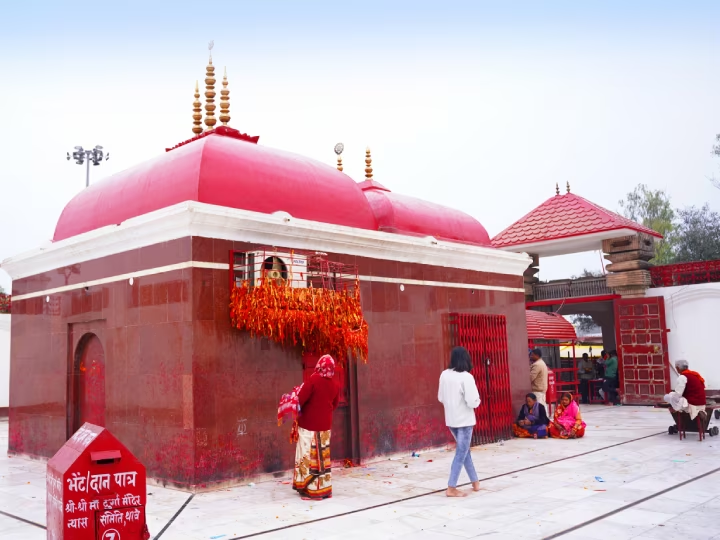In Thawe, Gopalganj District, Bihar, near the Gopalganj-Siwan National Highway, Thave Mandir, also called Maa Thawewali Mandir, is a holy place where people come to pray to Goddess Durga. Known as a Shakti Pitha, the temple is famous for a rare cross-shaped tree and the story of Rahshu Bhagat Ji, a devoted follower who is said to have called Maa Thawewali from Kamakhya. People visit the temple seeking blessings, fulfillment of wishes, and inner peace.
History of Thave Mandir
Locals say Thave Mandir dates back to around the 14th century, though some link it to even older times. One well-known story tells of Raja Manan Singh of the Chero dynasty, a devotee of Durga, who ruled Thawe during a famine. Rahshu Bhagat Ji, a local tantric, miraculously produced rice from grass to feed the people. The king doubted him and challenged Rahshu to call Durga—she appeared, but the king’s kingdom fell. Another tale says that in 1714, Yuvraj Shahi Bahadur of Hathua, after dreaming that Durga promised him victory over a Champaran zamindar, discovered her idol under a tree and built the temple. British visitors like Francis Buchanan in the 1800s recorded its fame.
The temple is about 6 km from Gopalganj town, near Thawe Junction railway station. After India gained independence in 1947, a local trust took charge of its upkeep. In 2017, a Dharmik Satsang Kendra was added for spiritual talks and yoga, costing around ₹15 lakh. Over centuries, Thave Mandir has remained an important pilgrimage site, attracting devotees from Bihar, Uttar Pradesh, and Nepal, especially during Navratri.
Legends of Thave Mandir
The temple is surrounded by many tales about Durga and Rahshu Bhagat Ji. One famous story says Rahshu who was a great tantric living in the Bhawaniapur forest, prayed to Durga during a famine. In a dream, she told him to offer grass at night, which miraculously turned into rice by morning. Rahshu fed the starving people, but Raja Manan Singh accused him of trickery and jailed him without food. Rahshu prayed again, and Durga, appearing as Singhasini Bhawani, came all the way from Kamakhya in Assam, passing through Patna’s Patan Devi and Saran’s Ami, and finally reached Thawe. She appeared with four arms, riding a vehicle drawn by seven lions, and destroyed the king’s palace. Rahshu’s own head split open, revealing a hand holding Durga’s bangle, granting him moksha. The king died, and the temple was built where Durga appeared.
Another story says the cross-shaped tree inside the temple marks Durga’s divine power. Locals believe that praying sincerely to Maa Thawewali can fulfill wishes, including health, marriage, or general well-being. Many also say the tree’s roots hold spiritual energy.
Architecture of Thave Mandir
The Thave Mandir has a simple, unadorned style, featuring a low dome and sturdy stone walls, built near the old fort of Thawe, now mostly in ruins. The main sanctum houses a 3-foot-tall idol of Durga with four arms, riding a lion, inside a compact 7-by-7-foot space. In the courtyard stands a peculiar tree shaped like a cross, unidentified by botanists, linked to legends of Durga’s divine power. Small black-stone shrines dedicated to Rahshu Bhagat Ji, Kali, and Ganesh are scattered around, decorated with carvings of Durga’s lion and weapons dating back to the 1700s.
The temple has a flat roof, repaired after past damage, and a small havan kund for fire rituals. A separate shrine for Rahshu Bhagat Ji attracts devotees as well. Pilgrims are especially drawn to the cross-shaped tree and the powerful idol of Durga.
Rituals and Festivals
The temple comes alive during festivals. Navratri, in Chaitra (March–April) and Ashvin (September–October), is the biggest, with a large mela attracting around 20,000–50,000 visitors each day. Devotees offer laddoos, peda, coconuts, and chunari, costing ₹20–100, for Aastha Pooja to seek blessings and prosperity. Mondays and Fridays see even bigger crowds for Durga’s blessings. Kartik Purnima also draws many pilgrims for river baths nearby.
Each day, priests perform aarti from 5:00–7:00 AM and again at 7:00 PM, using bells, incense, and ghee lamps. Bhog, like sugar-free pidakiya made with desi ghee, is offered around 12:30 PM. Special pujas, such as vehicle blessings (₹51–501) or mundan (₹51), can be booked online or at the temple. Free meals serve 5,000–15,000 people during Navratri.
Information for Travelers
Hours and Entry: Open daily, 4:00 AM to 9:00 PM, with a rest from 12:30 PM to 2:30 PM. Entry’s free, but pujas cost ₹20–501. No photos inside the main shrine; lockers are free at the gate. Modest clothes, like sarees or dhotis, are needed, no shorts or sleeveless tops. All castes can enter. Navratri and Mondays get busy, with 5,000–10,000 folks, so come early. Wheelchair access is limited, but help’s available.
How to Get There:
Air: Patna Airport is 120 km off, with flights to Delhi (1.5 hours) and Kolkata (1 hour). Taxis take 3 hours to Thawe.
Train: Thawe Junction, 500 meters off, connects to Siwan (1 hour) and Gorakhpur (2 hours). Autos take 2 minutes to the temple.
Road: Thawe’s 6 km from Gopalganj on NH-531, 30 minutes by auto or taxi. Buses run from Patna (3 hours) and Siwan (1 hour). Autos or rickshaws, costing ₹10–20, work locally.
Best time to go is October to March when it’s cooler, around 10–25°C. Mornings are nice and quiet. Navratri mela gets very crowded, long lines, so better plan. Summers April–June very hot, up to 45°C, avoid if you can. Bring cash, not many ATMs nearby.
Nearby Attractions:
Dighwa Dubauli: 20 km off, a market town with old temples.
Arar More: 6 km off, a busy hub in Gopalganj.
Mahendra Nath Temple: 50 km off, a Shiva shrine in Siwan.
Gandak River: Right there, for holy dips during festivals.











